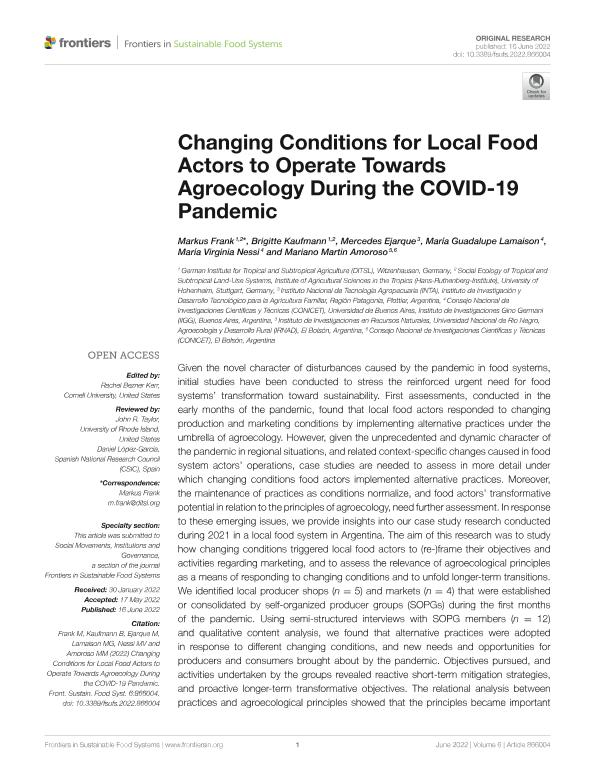Mostrar el registro sencillo del ítem
dc.contributor.author
Frank, Markus

dc.contributor.author
Kaufmann, Brigitte
dc.contributor.author
Ejarque, Mercedes

dc.contributor.author
Lamaisón, María Guadalupe

dc.contributor.author
Nessi, María Virginia

dc.contributor.author
Amoroso, Mariano Martin

dc.date.available
2022-07-06T21:36:02Z
dc.date.issued
2022-06
dc.identifier.citation
Frank, Markus; Kaufmann, Brigitte; Ejarque, Mercedes; Lamaisón, María Guadalupe; Nessi, María Virginia; et al.; Changing conditions for local food actors to operate towards agroecology during the COVID-19 pandemic; Frontiers Media; Frontiers in sustainable food systems; 6; 866004; 6-2022; 1-17
dc.identifier.uri
http://hdl.handle.net/11336/161480
dc.description.abstract
Given the novel character of disturbances caused by the pandemic in food systems, initial studies have been conducted to stress the reinforced urgent need for food systems’ transformation toward sustainability. First assessments, conducted in the early months of the pandemic, found that local food actors responded to changing production and marketing conditions by implementing alternative practices under the umbrella of agroecology. However, given the unprecedented and dynamic character of the pandemic in regional situations, and related context-specific changes caused in food system actors’ operations, case studies are needed to assess in more detail underwhich changing conditions food actors implemented alternative practices. Moreover, the maintenance of practices as conditions normalize, and food actors’ transformative potential in relation to the principles of agroecology, need further assessment. In response to these emerging issues, we provide insights into our case study research conducted during 2021 in a local food system in Argentina. The aim of this research was to study how changing conditions triggered local food actors to (re-)frame their objectives and activities regarding marketing, and to assess the relevance of agroecological principles as a means of responding to changing conditions and to unfold longer-term transitions. We identified local producer shops (n = 5) and markets (n = 4) that were established or consolidated by self-organized producer groups (SOPGs) during the first months of the pandemic. Using semi-structured interviews with SOPG members (n = 12) and qualitative content analysis, we found that alternative practices were adopted in response to different changing conditions, and new needs and opportunities for producers and consumers brought about by the pandemic. Objectives pursued, and activities undertaken by the groups revealed reactive short-term mitigation strategies, and proactive longer-term transformative objectives. The relational analysis between practices and agroecological principles showed that the principles became important means of responding to changing conditions and to unfold longer-term transitions. The cases illustrate how local food actors operationalized agroecological principles, and in turn how principles can be used to investigate the nature and potentials of food actors’ alternative practices, highlighting the relevance of agroecology to co-design sustainabilitytransitions in local food systems and to mitigate possible future crisis.
dc.format
application/pdf
dc.language.iso
eng
dc.publisher
Frontiers Media

dc.rights
info:eu-repo/semantics/openAccess
dc.rights.uri
https://creativecommons.org/licenses/by-nc-sa/2.5/ar/
dc.subject
AGROECOLOGICAL PRINCIPLES
dc.subject
AGROECOLOGICAL TRANSITIONS
dc.subject
SHOCK-MITIGATION RESPONSES
dc.subject
TRANSFORMATIVE POTENTIAL OF LOCAL FOOD ACTORS
dc.subject
COVID-19
dc.subject.classification
Sociología

dc.subject.classification
Sociología

dc.subject.classification
CIENCIAS SOCIALES

dc.title
Changing conditions for local food actors to operate towards agroecology during the COVID-19 pandemic
dc.type
info:eu-repo/semantics/article
dc.type
info:ar-repo/semantics/artículo
dc.type
info:eu-repo/semantics/publishedVersion
dc.date.updated
2022-06-30T19:01:18Z
dc.identifier.eissn
2571-581X
dc.journal.volume
6
dc.journal.number
866004
dc.journal.pagination
1-17
dc.journal.pais
Suiza

dc.description.fil
Fil: Frank, Markus. University of Hohenheim; Alemania. German Institute for Tropical and Subtropical Agriculture; Alemania
dc.description.fil
Fil: Kaufmann, Brigitte. German Institute for Tropical and Subtropical Agriculture; Alemania. University of Hohenheim; Alemania
dc.description.fil
Fil: Ejarque, Mercedes. Instituto Nacional de Tecnologia Agropecuaria. Centro Regional Patagonia Norte. Instituto de Investigacion y Desarrollo Tecnologico Para la Agricultura Familiar Region Patagonia.; Argentina. Consejo Nacional de Investigaciones Científicas y Técnicas; Argentina
dc.description.fil
Fil: Lamaisón, María Guadalupe. Universidad de Buenos Aires. Facultad de Ciencias Sociales. Instituto de Investigaciones "Gino Germani"; Argentina. Consejo Nacional de Investigaciones Científicas y Técnicas; Argentina
dc.description.fil
Fil: Nessi, María Virginia. Universidad de Buenos Aires. Facultad de Ciencias Sociales. Instituto de Investigaciones "Gino Germani"; Argentina. Consejo Nacional de Investigaciones Científicas y Técnicas; Argentina
dc.description.fil
Fil: Amoroso, Mariano Martin. Instituto Nacional de Tecnologia Agropecuaria. Centro Regional Patagonia Norte. Instituto de Investigacion y Desarrollo Tecnologico Para la Agricultura Familiar Region Patagonia.; Argentina. Consejo Nacional de Investigaciones Científicas y Técnicas. Centro Científico Tecnológico Conicet - Patagonia Norte. Instituto de Investigaciones en Recursos Naturales, Agroecología y Desarrollo Rural. - Universidad Nacional de Rio Negro. Instituto de Investigaciones en Recursos Naturales, Agroecología y Desarrollo Rural; Argentina
dc.journal.title
Frontiers in sustainable food systems
dc.relation.alternativeid
info:eu-repo/semantics/altIdentifier/doi/http://dx.doi.org/10.3389/fsufs.2022.866004
dc.relation.alternativeid
info:eu-repo/semantics/altIdentifier/url/https://www.frontiersin.org/articles/10.3389/fsufs.2022.866004/full
Archivos asociados
